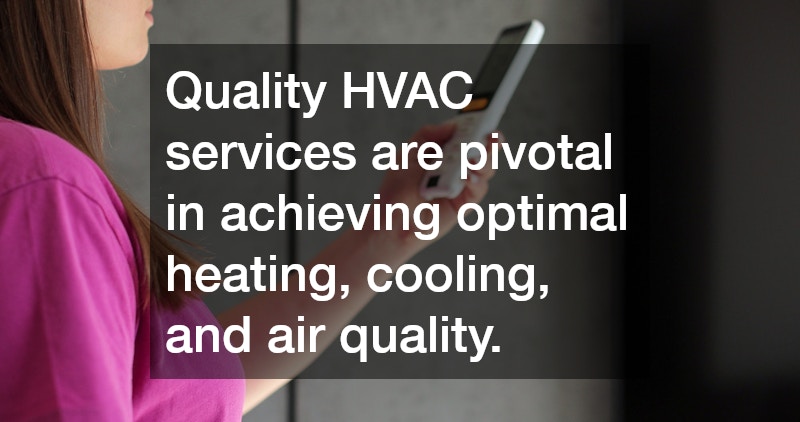In this article, we explore the essentials of quality HVAC services, focusing on heating, cooling, and air quality. Understanding the importance of these services can enhance comfort and efficiency in any space.
How Do Quality HVAC Services Impact Energy Efficiency?
Understanding Energy Efficiency in HVAC Systems
Energy efficiency in HVAC systems is crucial for reducing operational costs and minimizing environmental impact. A quality HVAC system ensures that heating and cooling are delivered effectively without excessive energy use.
Factors such as proper installation, regular maintenance, and the use of newer, more efficient technology contribute significantly to an HVAC system’s energy efficiency. By focusing on these elements, homeowners can ensure their HVAC systems operate at optimal levels.
The efficiency of an HVAC system can be assessed by its Seasonal Energy Efficiency Ratio (SEER), which measures cooling output over a typical cooling season. High-efficiency systems are typically characterized by a higher SEER rating, indicating better energy performance.
Steps to Improve HVAC Energy Efficiency
Several practical measures can be taken to improve the energy efficiency of an HVAC system. Regularly replacing air filters and scheduling professional tune-ups are essential steps in maintaining efficiency.
Additionally, sealing ducts and insulating pipes can prevent energy loss, further contributing to energy savings. Upgrading to a programmable thermostat allows for better control over heating and cooling settings, optimizing energy use.
Investing in modern, energy-efficient units can also significantly reduce energy consumption. High-efficiency HVAC models often come equipped with variable-speed compressors and advanced controls to enhance their performance.
What Are the Top Features of Modern HVAC Systems?
Smart Technology Integration
Modern HVAC systems increasingly incorporate smart technology to enhance user convenience and system efficiency. Features such as remote control via mobile apps and AI-driven climate control are becoming standard.
This technology allows homeowners to monitor and adjust their HVAC systems remotely, ensuring optimal performance and energy savings. Automated systems can learn user preferences and adapt settings accordingly.
By integrating with home automation systems, smart HVAC solutions provide seamless heating and cooling management. This technological advancement not only improves comfort but also contributes to energy conservation.
Advanced Air Quality Solutions
Ensuring high indoor air quality has become a major focus for modern HVAC solutions. Advanced filtration systems and air purifiers are essential components of such systems.
These technologies are designed to capture pollutants, allergens, and pathogens, ensuring a healthier indoor environment. UV light systems and bi-polar ionization can also be incorporated to neutralize airborne contaminants.
By prioritizing air quality, modern HVAC systems help reduce health risks associated with poor indoor air. Homes equipped with these solutions offer a safe and comfortable space for occupants.
Why is Regular Maintenance Essential for HVAC Systems?
Benefits of Routine HVAC Maintenance
Regular HVAC maintenance is vital for the longevity and performance of heating and cooling systems. It helps prevent unexpected breakdowns and costly repairs.
Routine checks and servicing ensure that the system operates at peak efficiency, reducing energy consumption and utility bills. This approach also enhances indoor comfort by maintaining consistent temperatures.
Timely maintenance services extend the lifespan of HVAC equipment, delaying the need for replacements. Overall, a well-maintained system provides reliable and efficient heating and cooling throughout the year.
Essential Maintenance Tips for Homeowners
Homeowners should schedule regular HVAC inspections with qualified professionals to ensure optimal functionality. This includes checking refrigerant levels, inspecting electrical connections, and cleaning condenser coils.
Simple tasks, such as changing air filters every one to three months, can significantly improve system efficiency and indoor air quality. It’s advisable to clean vents and remove any blockages from airflow paths.
Ensuring proper insulation is another critical maintenance step. Well-insulated ducts prevent energy loss and enhance overall system efficiency, leading to consistent comfort and reduced energy costs.
Quality HVAC services are pivotal in achieving optimal heating, cooling, and air quality. By understanding their impact on energy efficiency, embracing modern features, and prioritizing regular maintenance, you can ensure a comfortable and healthy indoor environment.
